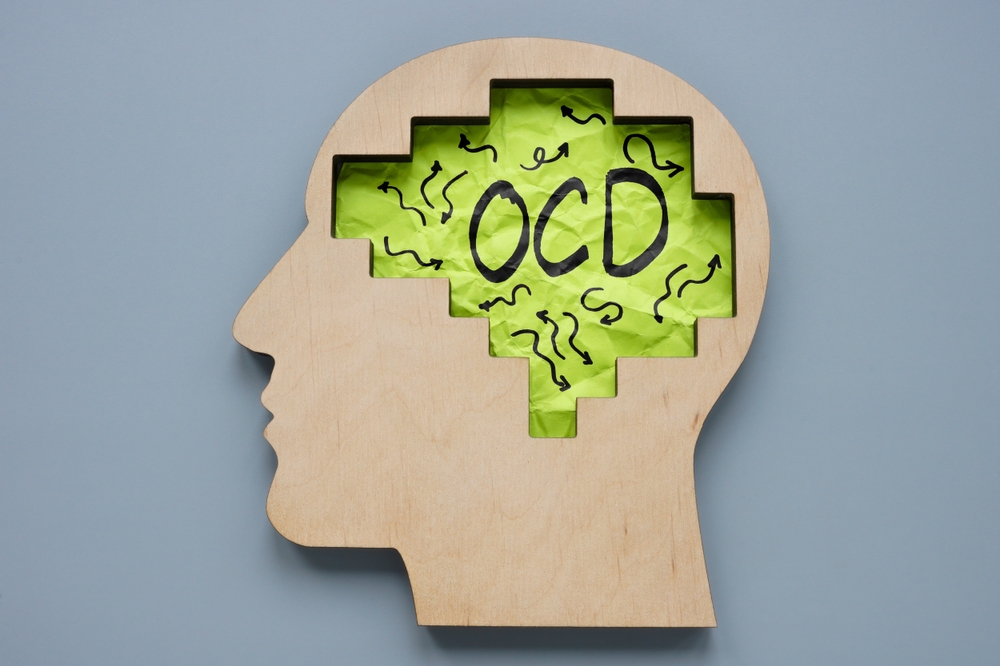Last Updated:
July 21st, 2025
OCD and Addiction | Symptoms and Support Options
What is OCD?
Obsessive-compulsive disorder (OCD) is a mental health condition that involves two key components: obsessions and compulsions. These are not just minor habits or personality traits but overwhelming cycles of thought and behaviour that can significantly interfere with daily life.

Obsessions
Obsessions are unwanted, intrusive thoughts, images or urges that repeatedly enter a person’s mind, causing distress and anxiety. These thoughts are often irrational, but they feel very real to the person experiencing them.
Common obsessions include:
- Contamination fears
- Doubt and checking
- Intrusive thoughts
- Order and symmetry (A need for things to be perfectly aligned, arranged in a certain order or done in a specific way.)
Compulsions
Compulsions are repetitive behaviours or mental rituals a person feels forced to perform in order to reduce anxiety or prevent something bad from happening. These actions provide temporary relief, but they ultimately reinforce the cycle of OCD by strengthening the belief that the obsession is a real threat.
Common compulsions include:
- Excessive cleaning and washing
- Checking rituals (Repeatedly ensuring the door is locked, the stove is off or that a mistake hasn’t been made.)
- Counting and repeating
- Seeking reassurance
Can OCD affect a person’s life?
OCD can have a significant impact on daily life. The effects of OCD vary from person to person, but because obsessions and compulsions can take up a lot of time and mental energy, they can interfere with work, relationships and overall well-being.
Below, we take a look at exactly why common traits of OCD can disrupt the lives of those with the condition:
- Time-consuming rituals: Compulsions can take up hours a day, making it hard to focus on work, school or daily responsibilities.
- Emotional exhaustion: The constant cycle of anxiety and relief from compulsions can leave a person feeling drained.
- Impact on relationships: OCD can make social interactions challenging, especially if compulsions or intrusive thoughts create isolation or misunderstandings.
- Work and school difficulties: Obsessions can make concentrating hard, and compulsions can interfere with productivity.
While these issues are, of course, disruptive, there is an even darker side of OCD: the links to addiction and dependency.
The link between substance addiction and OCD
Understanding the link between OCD and addiction isn’t always straightforward. But research paints a clear picture, and the two are more connected than you might think.
A large study of 6 million people found that individuals with OCD face:
- 3.7x higher risk of substance misuse
- 4.5x higher risk of alcohol-related disorders
- 6.7x higher risk of drug-related disorders
- 1.2x higher risk of substance-related criminal convictions
- 5.2x higher risk of substance-related death
These numbers highlight just how serious the relationship between OCD and addiction can be, but why does this happen? Researchers suggest that the intrusive thoughts and repetitive behaviours that define OCD can feel overwhelming. Some individuals may turn to substances as a coping mechanism, using alcohol or drugs to quiet the obsessive thoughts and anxiety momentarily.
But this relief is short-lived. Substance use doesn’t ease OCD symptoms and, in fact, worsens them while introducing a whole new risk altogether: addiction.
The link between OCD and addiction underscores the importance of treatment that addresses both conditions together rather than tackling them separately. Recognising this connection is the first step toward finding real, lasting relief.
The link between gambling addiction and OCD
A 2023 study looked at how obsessive-compulsive disorder (OCD) and problem gambling (PG) affect the way people learn from rewards and losses. It found that people with OCD struggle to learn from negative experiences when making reward-seeking decisions. Their brains don’t register bad outcomes as strongly, meaning they may repeat behaviours even when they aren’t working. On the other hand, problem gamblers overlearn from wins and ignore losses, making them more likely to chase rewards despite negative consequences.
At first glance, these conditions seem different, but there’s a potential link. Compulsions and repetitive behaviours drive OCD, and gambling can easily become another ritualistic habit. This could be especially true if a person has obsessions with numbers, patterns or a need for control. Someone with OCD may not gamble for thrills, but they might develop rigid betting strategies, chase “lucky” numbers or struggle to stop once they start.

Because people with OCD also struggle to adjust behaviour based on losses, they might not process gambling losses as strongly, increasing the risk of addiction. While OCD itself doesn’t make someone more likely to gamble, it could make quitting harder if gambling becomes a compulsion rather than just a habit.
The link between other behavioural addictions and OCD
A study comparing 150 OCD patients and 131 healthy individuals found that those with OCD were far more likely to struggle with compulsive behaviours that resemble addiction, including:
- Problematic internet use (8.7%): Constant scrolling, checking or engaging in online activities can become compulsive, especially when used to escape intrusive thoughts.
- Compulsive sexual behaviour (6.8%): Seeking relief from anxiety through sexual activity can turn into a repetitive cycle, much like OCD rituals.
- Compulsive buying (6.4%): Shopping can provide a temporary emotional boost, but for some, it becomes an uncontrollable urge driven by obsessive thinking.
These behaviours may seem like coping mechanisms, but they often reinforce the OCD cycle, making it even harder to break free. That’s why understanding the link between OCD and behavioural addiction is crucial because real recovery means addressing both.
How are OCD and addiction treated?
When someone has both OCD and addiction, it’s important to address both conditions together. Addiction treatment programmes primarily focus on substance or behavioural addictions, but many of the therapies used can also help with OCD-related traits. Treating one condition while ignoring the other can make recovery more difficult, as they often feed into each other.
Dialectical behaviour therapy (DBT) is particularly useful for those with emotional distress linked to OCD and addiction. It teaches skills like distress tolerance and emotional regulation, helping individuals resist compulsions and addictive cravings without resorting to harmful coping mechanisms.
Where can I find more information on OCD and addiction treatment?
Struggling with both OCD and addiction can feel overwhelming, but you don’t have to face it alone. At Addiction Helper, we connect you with specialist treatment programmes that address both conditions, helping you regain control. Call today for free, confidential advice and support.
Our compassionate team are ready and available to take your call, and guide you towards lasting the lasting addiction recovery you deserve.
Frequently Asked Questions
(Click here to see works cited)
- Virtanen S, Kuja-Halkola R, Sidorchuk A, Fernández de la Cruz L, Rück C, Lundström S, Suvisaari J, Larsson H, Lichtenstein P, Mataix-Cols D, Latvala A. Association of Obsessive-Compulsive Disorder and Obsessive-Compulsive Symptoms With Substance Misuse in 2 Longitudinal Cohorts in Sweden. JAMA Netw Open. 2022 Jun 1;5(6):e2214779. doi: 10.1001/jamanetworkopen.2022.14779. PMID: 35666504; PMCID: PMC9171556.
- Suzuki S, Zhang X, Dezfouli A, Braganza L, Fulcher BD, Parkes L, Fontenelle LF, Harrison BJ, Murawski C, Yücel M, Suo C. Individuals with problem gambling and obsessive-compulsive disorder learn through distinct reinforcement mechanisms. PLoS Biol. 2023 Mar 14;21(3):e3002031. doi: 10.1371/journal.pbio.3002031. PMID: 36917567; PMCID: PMC10013903.
- Dev Rai, et al. “Behavioural Addictions in Obsessive Compulsive Disorder – Prevalence and Clinical Correlates.” Psychiatry Research Communications, Elsevier, 13 Dec. 2021, www.sciencedirect.com/science/article/pii/S2772598721000167.

